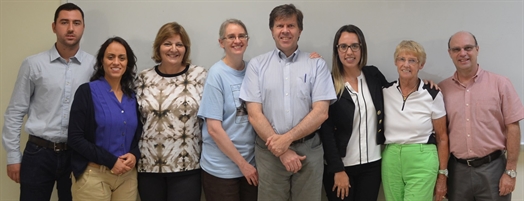SEED BIOLOGY
UNDERSTANDING HOW THESE COMPLEX ENTITIES FUNCTION
SEED BIOLOGISTS
If you eat, you are invested in seed biology! Worldwide, 70 percent of humanity’s food is seed and much of the remaining 30 percent is animals to which we feed seeds; fruits and vegetables that are started from seeds; yes, even farmed fish that are fed meal based on seeds and fish byproducts!
The capacity to store these seeds in a dry state allows us to ship food, as seeds, worldwide where its lack of moisture serves to protect it from pathogen attack and preserve its quality. Seeds then are the foundation of a highly varied ethnic cuisine and, while the delicacy itself is produced at the site of consumption, it is made from the same raw product that might have been produced half a world away! To emphasize this point, the shipped wheat seeds make Tagliatelle in Ancona, Italy; Pierogi in Rzeszow, Poland; and Biang Biang noodles in Xi’an, China!
With our civilization entirely dependent on seeds for food, a considerable number of research scientists are involved worldwide in investigating how the seed performs its function as a propagule. From dormancy and dry afterripening, to germination and desiccation tolerance, scientists focus directly on this stage of the plant life cycle.
In addition to studying seeds directly, many plant biologists investigating agronomic crops are also focused on the seed. Pathologists combat plant disease that would reduce the photosynthate available to produce seeds. Entomologists do the same combatting insects that directly or indirectly reduce crop yield. Agricultural engineers devise better seeders, cultivators and harvesters geared towards efficiently planting, producing and harvesting seeds.
With the world population predicted to reach 9.8 billion by 2050, as much information as possible on how seeds function as a propagule and how their composition might be favorably altered for nutritional content is required if we are to feed these people on limited arable land in an increasingly unpredictable environment.
The capacity to store these seeds in a dry state allows us to ship food, as seeds, worldwide where its lack of moisture serves to protect it from pathogen attack and preserve its quality. Seeds then are the foundation of a highly varied ethnic cuisine and, while the delicacy itself is produced at the site of consumption, it is made from the same raw product that might have been produced half a world away! To emphasize this point, the shipped wheat seeds make Tagliatelle in Ancona, Italy; Pierogi in Rzeszow, Poland; and Biang Biang noodles in Xi’an, China!
With our civilization entirely dependent on seeds for food, a considerable number of research scientists are involved worldwide in investigating how the seed performs its function as a propagule. From dormancy and dry afterripening, to germination and desiccation tolerance, scientists focus directly on this stage of the plant life cycle.
In addition to studying seeds directly, many plant biologists investigating agronomic crops are also focused on the seed. Pathologists combat plant disease that would reduce the photosynthate available to produce seeds. Entomologists do the same combatting insects that directly or indirectly reduce crop yield. Agricultural engineers devise better seeders, cultivators and harvesters geared towards efficiently planting, producing and harvesting seeds.
With the world population predicted to reach 9.8 billion by 2050, as much information as possible on how seeds function as a propagule and how their composition might be favorably altered for nutritional content is required if we are to feed these people on limited arable land in an increasingly unpredictable environment.

Left to right: Mr. Leandro Vilela Reis, Prof. Patrícia Duarte de Oliveira Paiva, Prof. Maria Laene Carvalho, Dr. Lynnette Dirk, Dr. Bruce Downie, Dr. Izabel Costa Silva Neta, Ms. Barbara Willard, Prof. Renato Paiva. A delegation from the University of Lavras, Minas Geras, Brazil, learning of the efforts of Leandro and Izabel on their respective projects. Taking the photo and not shown is Prof. Thelma Safadi, also of the delegation.

An overview of participants of the 2017 Triennial Meeting of the International Society for Seed Science, Monterey bay, California, U.S.A.

An overview of participants of the 2017 Joint Symposium on Plant Biology, University of Kentucky and Northwest Agriculture and Forestry University, Yangling, Shaanxi, China, May 31.



